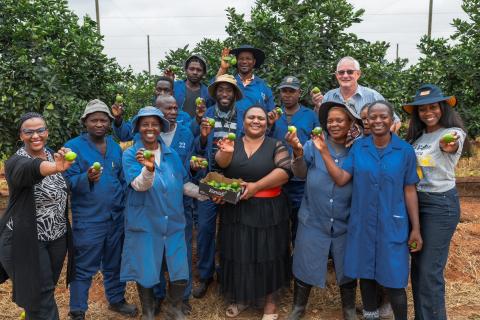
Yashveen Singh’s journey with SAB began eight years ago at the Springfield depot in Durban where he was employed as an account manager. “My first day of work, I was obviously very excited to be there,” Yashveen recalls. “Then, I was told that I was given Zenzele shares. That was really exciting, because it was something that I didn’t expect. As soon as I received the shares, I realised what a great decision I’d made to join SAB; not only was I an employee, but now I was actually part-owner of this company.”
Before joining the company, Yashveen hadn’t known about the free shares given to black employees as part of the SAB Zenzele Employee Trust scheme. Now, he’s an authority on how it works.
“There are three aspects to the Zenzele scheme,” he explains. “There’s the SAB Foundation, which does all the CSI investments. Then there’s a retailer scheme. What it does, it encourages retailers to perform and to sell our brands in order to get a greater shareholder return. And then there’s a SAB employee scheme, which I’m a part of, and which to me, creates this sense of ownership in the company where all the people work towards a common goal, the success of SAB, in order for us to get a greater shareholder return.”
“I think that it was very progressive for the directors to think of a scheme like Zenzele. They were trying to do more for the upliftment of the people of South Africa. It was not just talk; they did something meaningful. The company made a R9.6 billion investment in Zenzele and that was in 2010!” Yashveen marvels.
“After a few years, I was promoted, and I received a top-up of my shares.” Yashveen says. “What it did, it encouraged you to work harder and to get promoted. So not only did you get an initial allocation, you could work harder and improve the amount of money you receive from the company.”
For the past three years, Yashveen’s been living and working in Port Shepstone where he’s currently employed as a People Business Partner in SAB’s East Coast Region. He says that he’s very proud to be working for a company that believes in truly empowering its employees and turning them into owners. “As an owner, when I go home late at night and see the lights on, I make sure to turn them off. If there’s a tap dripping, I close it. I feel like I’m part of this global company, I actually own it, so I make sure that I treat the business like it’s my own,” Yashveen says.
“Every six months or so, we receive a dividend from Zenzele. What I do, is take it and buy more AB InBev shares with the money, creating this nest egg for myself. When I retire, I will be able do so comfortably, Yashveen says. Although he’s unmarried and has no children of his own, Yashveen is thinking of the future. “Eventually I want to pass down my Zenzele shares to my children and grandchildren,” he says. “I think it’s a great legacy to leave behind.”
Background
Since launching SAB Zenzele, the company’s broad-based black economic empowerment programme in 2010, SAB has disbursed a total of R4-billion to its three shareholder groups. Beneficiaries include black SAB employees via the SAB Employee Trust, the owners of black-owned beer and soft drink retail establishments through SAB Zenzele Holdings Limited and the SAB Foundation Trust, which supports entrepreneurship projects for the benefit of low-income communities.
A combination of key features makes the transaction distinctive:
- The benefits of the transaction are specifically targeted at major stakeholder groups who have played a meaningful role in SAB’s long-term business success.
- The transaction was made affordable and easily accessible for targeted stakeholders. Employees and the SAB Foundation are not required to pay for their shares, and retailers have made a nominal cash investment.
- No external bank funding was required, contributing significantly to the sustainability of the transaction.
- Regular meaningful cash dividends were paid to all participants from year one, delivering a significant economic benefit.
- Through the SAB Foundation, many historically disadvantaged South Africans benefit from sustainable, ongoing investment aimed at fostering entrepreneurship.



